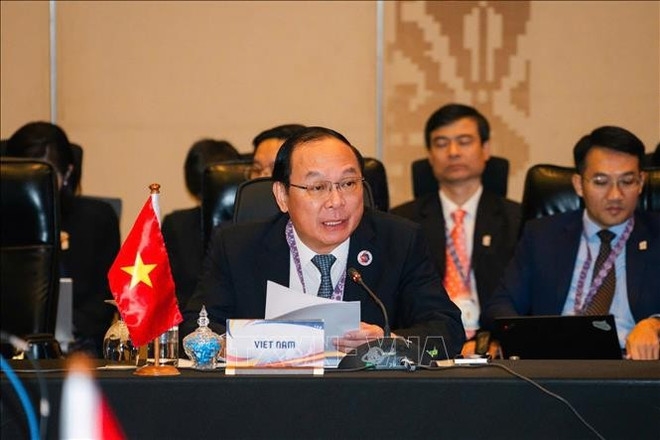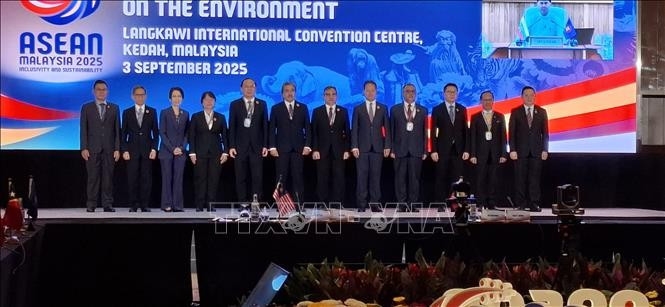    |
 |
|
Deputy Minister of Agriculture and Environment Le Cong Thanh speaks at the AMME-18 in Langkawi, Malaysia. |
In his speech delivered at the 18th ASEAN Ministerial Meeting on the Environment (AMME-18) and 20th Meeting of the Conference of Parties to the ASEAN Agreement on Transboundary Haze Pollution (COP-20 AATHP) and related meetings in Langkawi, Malaysia on September 3, Thanh highlighted Vietnam’s achievements in environmental protection and climate change response, noting significant improvements across multiple indicators.
Vietnam currently ranks 51st out of 165 countries and territories in sustainable development, he said, noting that the country has proactively proposed and participated in numerous ASEAN environmental initiatives, including contributing 12 ASEAN Heritage Parks, the highest number in the region, and actively promoting dialogue on energy transition, carbon markets, and circular economy.
Amid escalating climate change, natural disasters, biodiversity loss, and environmental pollution, the Vietnamese official called on ASEAN states to strengthen regional cooperation mechanisms; align national strategies with ASEAN frameworks; mobilize large-scale green financing; develop a regional carbon market; accelerate the transition to a circular economy and clean energy.
He also underlined the need to propose joint initiatives for ecosystem restoration, forest and marine conservation, and protection of endangered species.
At AMME-18, delegates approved six new ASEAN Heritage Parks, bringing the total number under the bloc’s protection to 69. Notably, Vietnam had three national parks recognized at the event, including Pu Mat National Park in the central province of Nghe An, Dong Nai Culture and Nature Reserve in the southern province of Dong Nai, and Xuan Thuy National Park in the northern province of Ninh Binh.
    |
 |
|
Deputy Minister of Agriculture and Environment Le Cong Thanh (fifth from left) and delegates pose for a group photo at the AMME-18 in Langkawi, Malaysia. |
The meetings also noted progress in developing the Post-2025 ASEAN Strategic Plan on Environment (ASPEN) and the ASEAN Climate Change Strategic Action Plan (ACCSAP), which will serve as guiding frameworks for policies and monitoring ASEAN’s future cooperation efforts on environment and climate change.
Regarding ongoing dialogues with partners such as Japan, the Republic of Korea, the U.S., and the European Union (E.U.), delegates welcomed the Joint Statement on the ASEAN-Japan partnership on environment and climate change, as well as the ASEAN - E.U. work program on environment and climate change for 2025–2026.
Additionally, the parties agreed to hold COP-21 AATHP in Vietnam in 2026 and the 22nd session in Myanmar in 2027. These decisions reflect ASEAN countries’ ongoing and strong commitment to cooperation, sharing, and jointly addressing environmental challenges, towards a shared vision of a sustainable ASEAN Community.
Leaders and environment ministers of ASEAN reaffirmed the region’s commitment to advancing cooperation and joint action toward a sustainable, inclusive, and resilient future.
Source: VNA